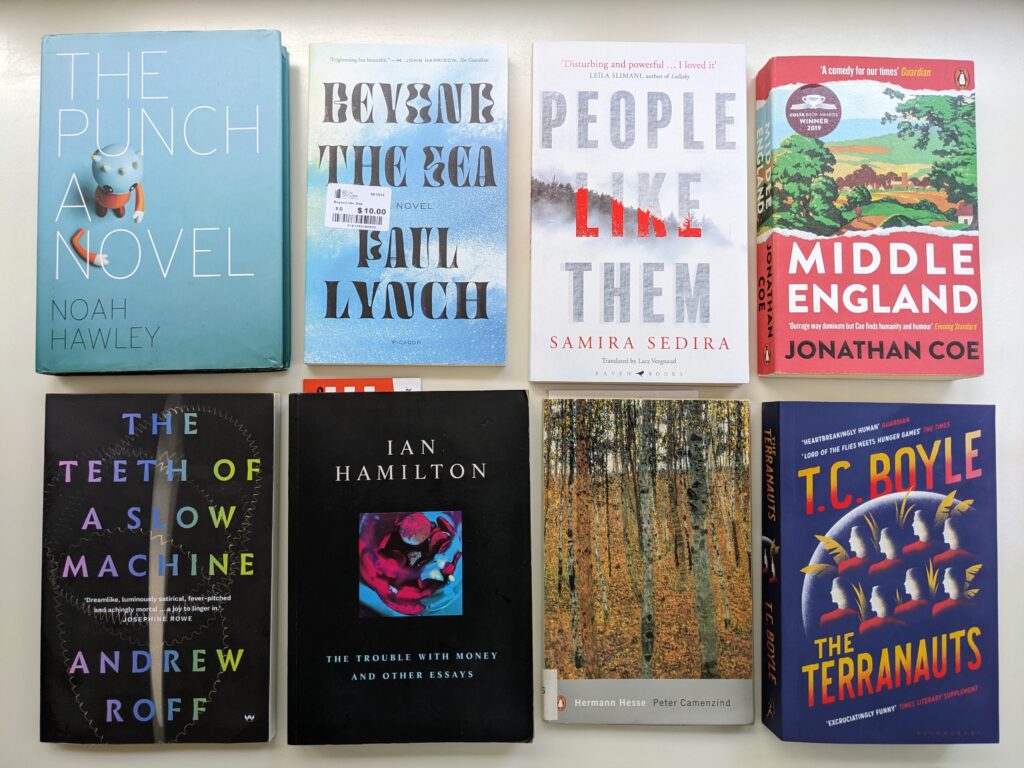
Six of these eight are straight out of the Op Shop, two of which would have been binned due to “Library Book” and “condition”. The first by Noah Hawley, The Punch, mostly notable for the comically detestable mother Doris and the misery she inflicts on her sons leading up to a larger family reunion to celebrate/send off her late husband. Never boring, it was an easy addictive read, even if son David and his dual relationships was far fetched. 4 stars.
I’d been wanting to read Beyond the Sea by Paul Lynch for ages, and then next thing I know, he’s up for a Booker nomination and then wins it, shortly after I’d finished this book. I’d say I enjoyed the first third, or maybe half of this, and then it went a little too poetic and feverish – I found myself skimming. Repetitive in a way that Life of Pi was not (both feature characters marooned on a boat that become increasingly desperate and desparing). I can’t give it more than 3 stars.
Did I read Samira Sedira‘s People Like Them in a single session, maybe two? I don’t remember but the font was big enough to make me feel like a pensioner. Fantastic short read really – some great tension between wealthy newcomers to a working class French town, and the modest locals, culminating in a horrific crime of frustration and envy. 4.5 stars!
Middle Engand by Jonathan Coe – a bunch of often funny vignettes showing the moods, enmity and polarisation that led to a successful Brexit vote. I’m not sure that Sofie’s end decision was very convincing or boded well for her future, but the author seems to determined to show a positive outlook for it all. A traditional plot that was thoroughly enjoyable and solid. 4 stars.
Cool title, not so cool stories. The Teeth of a Slow Machine by Andrew Roff made me feel old and impatient. Some of the tales here just made me want to skim and skip, and I’m glad it was short. I don’t think my brain is plastic enough to enjoy radical and inventive departures like this, which I would have enjoyed in my 20s. I’m not the target audience. 3 stars.
I’m been interested in reading works by / about minor writers or critics from a former age – say 1950s and 1960s. The people we read about in popular culture are no less interesting, but their stories have been over-told to death. There is something about the style or writing I enjoy too – its shows experience, perspective and erudite reasoning in an era where the printed word was far more important than it is today. Ian Hamilton (1938-2001) is one such writer – in his The Trouble with Money collection (1998), within about 100 pages I’d learnt about Cyril Connelly, Edmund Wilson, Elizabeth Bishop, W.H. Auden, Stephen Spender and Salmon Rushdie – all excellent shortish pieces mostly reviewing biographies written about them. I just loved this collection even if I’ve forgotten nearly everything about those individuals. 4.5 stars.
The only way I was ever going to read Hermann Hesse was by reading one of his short ones, and it couldn’t be shorter at 139 pages. Peter Camenzind (1904) details a young writers’ passionate musings whilst wandering through Europe (mostly Italy) and then in the second half, reflecting on his decisions and judgements of people, including the poor Boppi, a half crippled hunchback. Interesting enough, but I doubt I’d get through 400 pages of Hesse. 3 stars.
The Terranauts was my annual attempt at pseudo-Sci Fi, and yeah, maybe not that successful really, and certainly not “excrutiatingly funny” as per the Times. It’s my second book by T.C Boyle and it was far too long, and too exaggerated in it’s human failings aspects for me to buy in to this story of the eight “colonists” to enter a bio-dome and the one envious colleague who would do anything to have herself inserted in their place. Not quite “Lord of the Flies meets Hunger Games” either. Just a fairly bitchy expose of the grumpy, tired science workers and their slowly deteriorating bodies. The final twist was not believeable either. I had such high hopes – 3.5 stars.